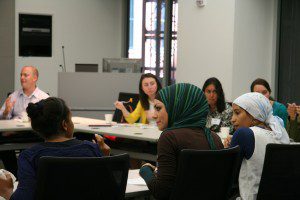While Muslims collectively groan almost daily over some mischaracterization of Islam or Muslims in the media, Islamic organizations and institutions continue to endure unwarranted government suspicion, as this recent Pulitzer Prize-winning Associated Press investigation series highlights. Now, more than ever, the Muslim community supports Muslim institutions and organizations as our champions who come to the collective aid of the Ummah here and abroad. We cheer them on, thanking them for their dedication while we write checks in support of their projects and initiatives.
However, many of us do not realize the sacrifice being made by the people who have chosen to work for these organizations. “Going Islamic” with their career path can effect a Muslim for their entire working life.
Fill your résumé with Islamic associations and watch your phone not ring with interview appointments for mainstream jobs — you’re now typecast as the “Muslim professional.”
Let’s say you have experience, or education in public relations and you accept a position working for an Islamic organization writing press releases, making media appearances and managing the branding for the organization. A few years later you want, or need to make a change, and begin applying for public relations jobs in other fields with a résumé chock full of Islamic associations and activities. Would it be realistic to expect interview requests to overflow your inbox? Hardly.
Here’s another hypothetical: You accept a full-time accounting position at the local mosque, and some lone-wolf, terrorist-wannabe happens to stop by the musallah for a few prayers, and the media gets wind of it. What do you think your chances are of landing a well-paying job with benefits in an American corporation when you’ve been working at the notorious mosque for several years?
It’s not impossible to work outside the Muslim community after long-term dedication to a Muslim cause; it’s just that one is at a disadvantage in the current political climate compared to another who has not pursued work experience with Islamic institutions or businesses, especially in regard to the arts and media fields.
Yet, if you poll Islamic workers in America and ask them why they are doing the work they do, they will say they feel compelled to serve the community for Allah’s sake, and don’t regret the decision to “go Muslim” with their career. We need to remember this when we pat each other on the back after another volunteer stint that we don’t claim on our professional résumé.
Employees Are Undervalued
Many boards and hiring committees of local Islamic organizations consist of professionals who volunteer their time “for the sake of Allah.” They are physicians, attorneys, engineers, and other successful Muslim professionals who have earned a good living in their profession and want to give back to the community with their free time. This is wonderful, and at this early stage of our community’s development, we couldn’t grow without their dedication.
With that said, it’s a common lament among Muslim staff that many boards, (not all), are out of touch with what a living wage is in America. They expect to hire staff for the organization and pay them little more than minimum wage. They don’t see the need to offer health insurance or contribute to the staff’s retirement. Fisabilillah, Brother.
Worse, I have heard anecdotally from many Muslim staffers that they are treated as if they are easily replaceable; they say they feel undervalued, or even disrespected by those in charge at the organization. This attitude also carries over to the community at large. A talented writer friend of mine recently said, “Someone once told me to my face they felt that only people who were not really good would be working for Muslim media.”
On the flip side we hear that our organizations are not always professional or competent compared to other faith groups. It’s common for Muslims to complain, “Look at what Christians are accomplishing! They have great institutions and outreach to the poor and the needy. Why can’t the Muslim organizations be like them?” Part of this malaise is due to the fact that many organizations don’t see the value in hiring skilled professionals, or they believe they shouldn’t spend the donation proceeds on anything other their charitable projects. Without offering competitive salary packages, our community loses the best and brightest who seek employment in the mainstream.
This brain and talent drain often results in all but the largest Muslim organizations and institutions being run with part-time or volunteer staff. You hear that “Brother Muhammad’s wife does the books part-time, check back again to see if she’s here to answer your question.” Mrs. Muhammad has gone back home for the summer, and no one knows who is in charge of paying vendors. Or, “My cousin Amir, (fresh off the boat, with no job or experience), can ‘fix up the website.'” When you search for information on the web you’ll find the site is four years out of date, or filled with misspellings and broken links. Cousin Amir doesn’t know what he’s doing.
Cost cutting and lack of concern for quality puts the entire community in a bad light. Unprofessional staff, non-existent, or badly built websites, unkempt offices, and poorly produced promotional materials loaded with unfortunate typos give a terrible impression to our neighbors, faith partners and government leaders. How are we to be players in the greater society if our public brand is laughably unprofessional?
What can be done?
Make sure you can afford to hire and keep staff before you run a help-wanted ad. If you can’t afford skilled employees, then do the work yourself until you can. Don’t fly into a hiring frenzy right after a successful fundraiser and then later throw everyone into the unemployment line when donations dry up. Have a long-term strategic plan and remember that the people you are hiring are now “typecast;” respect their sacrifice.
1. Hire well-qualified staff. Make sure they are suited for the position and not applying because they aren’t qualified to work elsewhere. Check their references and find someone in a related field to assess their work and experience.
2. Offer competitive salaries to attract more qualified staff, and at least offer a basic package with healthcare and vacation. If you hire professional staff, they will find ways to work efficiently within the parameters of fluctuating donor response. Muslims who choose to work into the non-profit sector don’t expect to have a corner office and a big expense account, and they will accomplish more with less, as long as they feel appreciated and respected.
3. Unskilled staff may seem cheaper in the short term, but will cost you with inefficiencies and cost overruns due to inexperience, or incompetence. Give fresh graduates opportunities for experience through paid internships and junior staff positions, but don’t put them in charge of your daily operations, managing staff or important functions just because they’re able to work for pennies while living at home with their parents.
4. Resist nepotism. Your wife may be looking for a second career, or your best friend may be out of work, but you should support them in other ways besides inflicting their lack of abilities on the organization simply because you’re on the board, or have some sort of influence with the hiring committee. It’s just wrong.
5. Once you hire professionals, let them do their work. Just as the Webmaster Khan wouldn’t tell Dr. Abdullah how to perform surgery; nor should the good doctor tell the webmaster that it should only take a week to restructure the mosque’s entire website, especially while working for a salary on par with McDonalds.
6. Finally, keep your staff protected from community and board politics. The organization’s employees didn’t sign on only to be mistreated a couple years later after a “board coup.”
If you follow and abide by the laws regulating a non-profit charitable organization this shouldn’t happen, but sadly it does. I have witnessed many cases of staff being treated like political footballs by their boards often in violation of the laws governing 501c3 organizations. It really hurts your heart considering we’re talking about Muslims in an Islamic environment.
Treat your staff with respect and the dignity that their professional skills demand. They aren’t lucky to work for your organization, instead you’re blessed that they chose to come and work for you — fisibilillah. With this ethos you will have loyal staff that will be proud to be part of your organization’s mission and growth, Insha’Allah.
Kari Ansari is a writer, editor and social commentator for the American Muslim community. Mrs. Ansari is a featured blogger for Huffington Post Religion, and has been published in the Chicago Tribune, The Washington Post, PBS, and Public Radio International’s “Speaking of Faith.”













